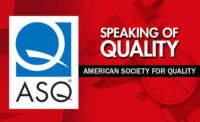You need to discuss a quality process change with a co-worker. It’s no secret around the office that your co-worker doesn’t like change and is particularly resistant to discussing a process change. This meeting needs to happen though, and it is your policy to go into each conference with a positive attitude.
You take a deep breath and begin the meeting. It runs smoothly. Your co-worker listens, shares concerns, and offers workable suggestions. Your co-worker was even pleased you asked him to be on the process improvement team. You walk back to your desk pleased with the outcome but more than a little perplexed. How did this consensus occur so easily?
Later in the day, you are summarizing your notes with a team member and relay the meeting results and your astonishment with the ease at which an agreement was met. Your teammate looks at you with a smile and says, “That’s not surprising at all. You’re likeable.”
Learn MoreAt ASQ we hear members and customers mention that quality professionals are excellent with the hard skills (technical and scientific) but there’s always opportunity for improvement in the soft skill arena. Here are a couple of ASQ resources to help you broaden your skill set—often using your hard skills to enhance your soft skills.
“Boost Your Brand.” Develop your soft skills, get noticed. “Turn Around or Shut Down.” This case study demonstrates how teams make a difference as well as let individual personalities shine. http://asq.org/2013/05/quality-management/turn-around-or-shut-down.html
“The Power of Positive.” How do you get your staff to embrace quality methods and change? |
Going into your meeting, you made sure you brought control charts, fishbone diagrams, and any tool that supported the suggested need for a process change. Could the meeting success really have had anything to do with you being so likeable? A recent University of Massachusetts (UM) study states, “yes.”
Before you read further, it is important to distinguish between charisma and likeability. Without pulling out the dictionary, the two terms can be differentiated in this way: a person is born with charisma, likeability is learned.
You know likeable and unlikeable people. You work with them, you live with them, you ride public transportation with them. As people, we are eager to label others as likeable or unlikeable—that’s what “we people” do, label one another. However, many people do not think of likeability as a skill. The UM study, relayed in a supporting Wall Street Journalarticle, suggests you could be making work a more difficult place to be if you aren’t working to develop your likeability. While most of us would like to believe that work is the key to getting things accomplished, the reality is this—relationships may trump work. This might not be a surprise, but there is no need to think of this situation in a negative way. Remember, likeability is learned.
As a quality professional, you have important information to dispense across the enterprise. Whether you begin with the product development department or processing plant, each item of information more often than not is essential to many, if not all, functions of the company.
The UM study found that likeable people are more likely to receive help at work and obtain useful information from others. Wouldn’t this be an ideal situation for the quality professional—breaking down silos to improve a process? Moreover, the managers interviewed agreed that “if an auditor is likeable and gives a well-organized argument, managers tend to comply with his suggestions, even if they disagree (with the auditor).” (“Why Likability Matters More Than Ever at Work,” Wall Street Journal, March 26, 2014)
Careerealism.com posted “How To Be More Likeable at Work: 10 Things To Do Today,” by G.L. Hoffman (www.careerealism.com/likeable-10-today/). As would be expected, some of the 10 points have foundations in many interpersonal arenas—be positive, actively listen, and so on. However, in the quality profession, you will often meet resistance—sometimes hostility—when you’re just doing your job. The attitude from others can take its toll on you. Being positive isn’t enough, but when you enter every meeting with the attitude that everyone has goodwill (like “you” in the opening anecdote), you come across not as an annoying ray of sunshine but as someone genuinely likeable.
Additionally, when you are placed in a position of conflict, it is easy (even for naturally likeable people) to either push a matter too hard or communicate in ways that may reveal your insecurities. There are ways to listen, show genuine humility and be accommodating without appearing weak. Combining these attributes makes you more likeable and, ultimately, more valuable to your organization.







